

What are the best, most objective online news sources? Juan Williams firing: Does journalism need more objectivity. Remember when journalists like Jayson Blair and Stephen Glass were fired for lying?

Now, in the wake of Juan Williams's firing from NPR, it seems like the bigger risk journalists take is when they tell the truth – at least about their own feelings. Skip to next paragraph Recent posts Subscribe Today to the Monitor Click Here for your FREE 30 DAYS ofThe Christian Science MonitorWeekly Digital Edition Straddling two worlds Mr. Objectivity in Journalism. DAVID BROOKS There is some dispute about whether objectivity can really exist.
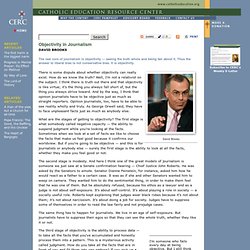
How do we know the truth? Well, I’m not a relativist on the subject. I think there is truth out there and that objectivity is like virtue; it's the thing you always fall short of, but the thing you always strive toward. And by the way, I think that opinion journalists have to be objective just as much as straight reporters.
Opinion journalists, too, have to be able to see reality wholly and truly. The Myth of Objectivity in Journalism. By This page has been accessed since 29 May 1996.
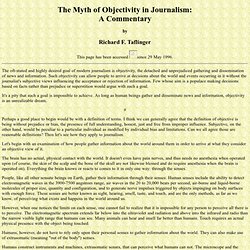
Newsweek Examines The "Myth" Of Media Objectivity. Newsweek: She tried to make a joke of it.

At the debate in Cleveland last week, Hillary Clinton brought up a "Saturday Night Live" skit about journalists fawning over Barack Obama at a mock debate. "Maybe we should ask Barack if he's comfortable and needs another pillow," said Clinton. Humor is often a substitute for anger, and if Clinton wasn't all that funny, maybe it is because she is sore at the press for seeming to go easier on her opponent. She has a point, but the truth about the media and the campaign cannot be caricatured simply as the deification of Obama and the hounding of Clinton. Objectivity & Balance: Today's Best Practices in American Journalism.
7 Principles of Media Objectivity. Media manipulation is one of the most unfortunate aspects of the Israeli-Palestinian conflict.
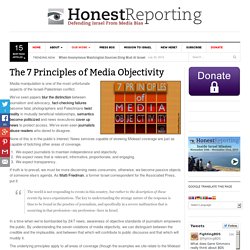
We’ve seen papers blur the distinction between journalism and advocacy, fact-checking failures become fatal, photographers and Palestinians twist reality in mutually beneficial relationships, semantics become politicized and news executives cover up news to protect access. We’ve even seen journalists abuse readers who dared to disagree. None of this is in the public’s interest. News services capable of skewing Mideast coverage are just as capable of botching other areas of coverage. We expect journalists to maintain independence and objectivity.We expect news that is relevant, informative, proportionate, and engaging.We expect transparency.
If truth is to prevail, we must be more discerning news consumers, otherwise, we become passive objects of someone else’s agenda. The world is not responding to events in this country, but rather to the description of these events by news organizations. The importance of objectivity in the media. The need for media objectivity in reporting conflict.
The media, both print and electronic, can play an important role in defusing tension, reducing and containing conflicts.
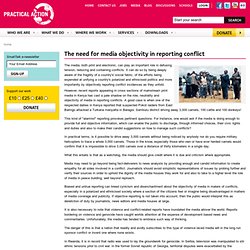
It can do so by being deeply aware of the fragility of a country's' social fabric, of the efforts being expended at unifying a country's polarized and ethnicised politics and more importantly by objectively reporting conflict incidences as they unfold. However, recent reports appearing in cross sections of mainstream print media in Kenya has cast a pale shadow on the role, neutrality and objectivity of media in reporting conflicts. A good case is when one of the respected dailies in Kenya reported that suspected Pokot raiders from East Baringo attacked a Turkana manyatta in Baragoi, Samburu district driving away 3,000 camels, 100 cattle and 100 donkeys!
This kind of "alarmist" reporting provokes pertinent questions. What this entails is that as a watchdog, the media should give credit where it is due and criticism where appropriate. no comments. Is the Mainstream Press Unbiased? Exposing Liberal Media Bias. Media Bias 101: What Journalists Really Think. Decades of Research Showing What Journalists Think, How Journalists Vote, What the Public Thinks About the Media, and What Journalists Say About Media Bias Media Bias 101 summarizes decades of survey research showing how journalists vote, what journalists think, what the public thinks about the media, and what journalists say about media bias.

The following links take you to dozens of different surveys, with key findings and illustrative charts. A printer-friendly, fully-formatted 48-page version of the report (updated January 2014) is available in PDF format here (1.8 MB). Media Bias Basics. How To Detect Bias In News Media. THE UNBEARABLE LIMITATIONS OF JOURNALISM. Media Bias in Interviewers’ Nonverbal Behavior: Potential Remedies, Attitud... Objectivity's Prophet. Neutralized. On the Relevance of Standpoint Epistemology to the Practice of Journalism: The Case for “Strong Objectivity” - Durham - 2006 - Communication Theory. Objectivity in Journalism: A Search and a Reassessment. Media bias. Objectivity (journalism)
Journalistic objectivity is a significant principle of journalistic professionalism.
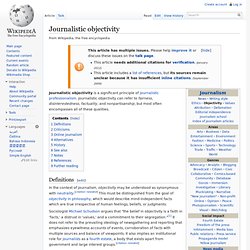
Journalistic objectivity can refer to fairness, disinterestedness, factuality, and nonpartisanship, but most often encompasses all of these qualities. Definitions[edit] Sociologist Michael Schudson argues that "the belief in objectivity is a faith in 'facts,' a distrust in 'values,' and a commitment to their segregation. "[1] It does not refer to the prevailing ideology of newsgathering and reporting that emphasizes eyewitness accounts of events, corroboration of facts with multiple sources and balance of viewpoints. Criticisms[edit] Advocacy journalists and civic journalists criticize the understanding of objectivity as neutrality or nonpartisanship, arguing that it does a disservice to the public because it fails to attempt to find truth.
Historical (including social and cultural) factors have also shaped objectivity in journalism, as acknowledged and addressed in peace journalism. Alternatives[edit]